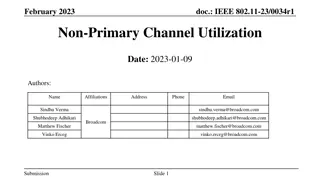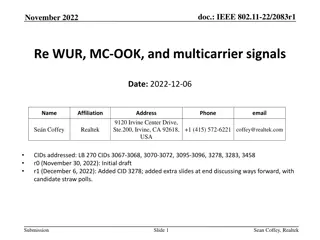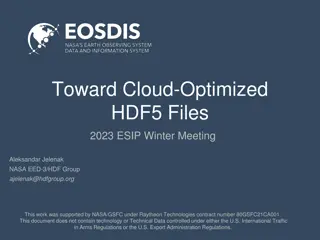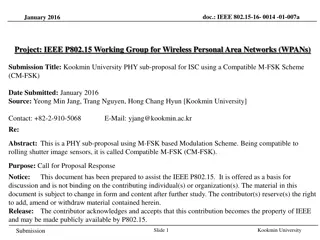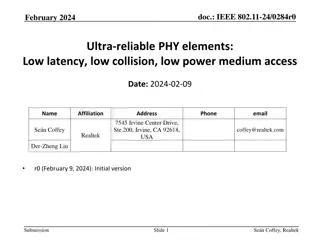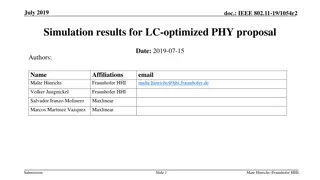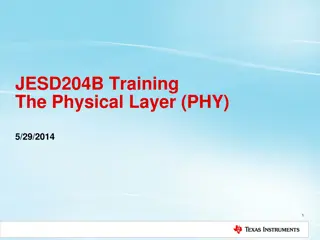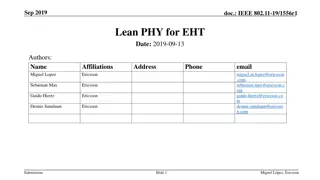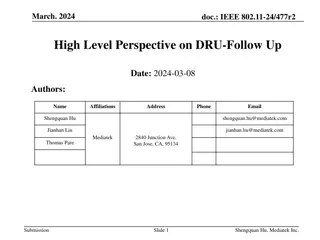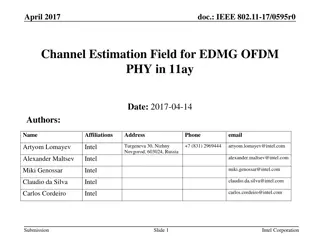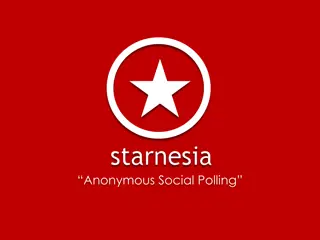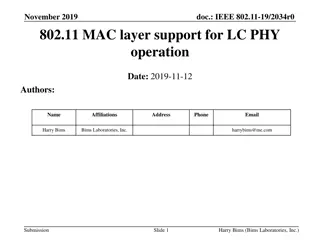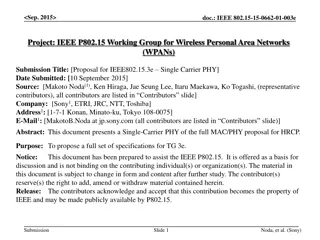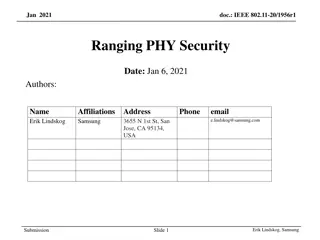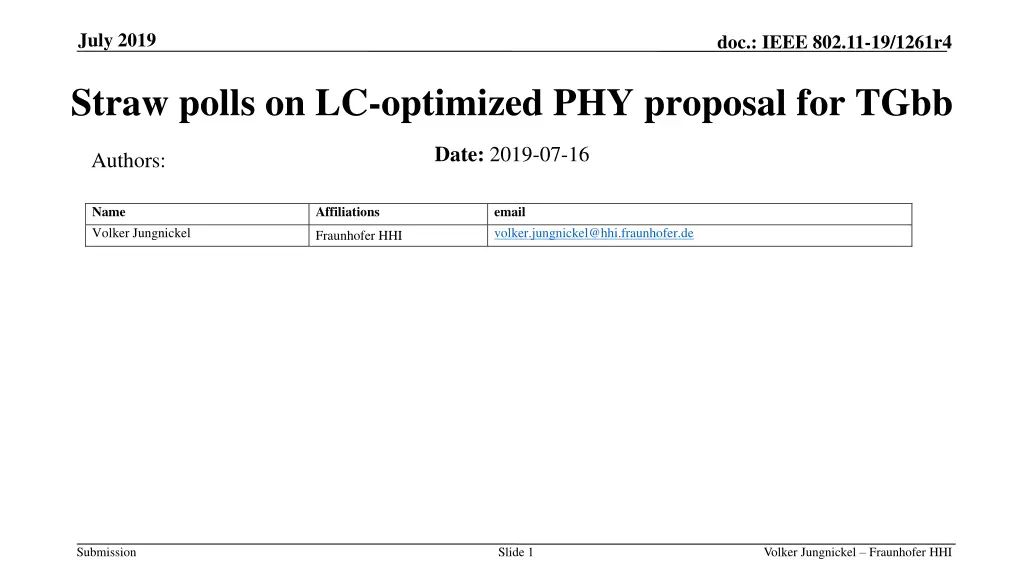
IEEE 802.11-19/1261r4 Straw Polls on LC-Optimized PHY Proposal for TGbb
"Explore the straw polls on an LC-optimized PHY proposal for TGbb in the IEEE 802.11-19/1261r4 document by Volker Jungnickel from Fraunhofer HHI. Topics include adaptive bit loading, bandwidth scalability, distributed MIMO, and G.9991 PHY considerations."
Download Presentation

Please find below an Image/Link to download the presentation.
The content on the website is provided AS IS for your information and personal use only. It may not be sold, licensed, or shared on other websites without obtaining consent from the author. If you encounter any issues during the download, it is possible that the publisher has removed the file from their server.
You are allowed to download the files provided on this website for personal or commercial use, subject to the condition that they are used lawfully. All files are the property of their respective owners.
The content on the website is provided AS IS for your information and personal use only. It may not be sold, licensed, or shared on other websites without obtaining consent from the author.
E N D
Presentation Transcript
July 2019 doc.: IEEE 802.11-19/1261r4 Straw polls on LC-optimized PHY proposal for TGbb Date: 2019-07-16 Authors: Name Volker Jungnickel Affiliations email volker.jungnickel@hhi.fraunhofer.de Fraunhofer HHI Volker Jungnickel Fraunhofer HHI Submission Slide 1
July 2019 doc.: IEEE 802.11-19/1261r4 Abstract The submission presents contains several straw polls concerning the proposal for an LC-optimized PHY for TGbb based on G.9991 PHY 1 [1]. Volker Jungnickel Fraunhofer HHI Submission Slide 2
July 2019 doc.: IEEE 802.11-19/1261r4 Straw Poll #1 Adaptive bit loading is useful to optimize LC performance due to low-pass behavior of optical frontends and NLOS propagation in the wireless channel. Shall adaptive bit loading be supported by every TGbb STA with bandwidth larger than 20 MHz? Y / N / A: 14 / 16 / 12 Volker Jungnickel Fraunhofer HHI Submission Slide 3
July 2019 doc.: IEEE 802.11-19/1261r4 Straw Poll #1a Adaptive bit loading is useful to optimize LC performance due to low-pass behavior of optical frontends and NLOS propagation in the wireless channel. Should adaptive bit loading be considered as one mode of operation in TGbb? Y / N / A: 19 / 0 / 5 Volker Jungnickel Fraunhofer HHI Submission Slide 4
July 2019 doc.: IEEE 802.11-19/1261r4 Straw Poll #2 TGbb PAR requires one PHY mode to reach 5 Gbit/s. Bandwidth of LC frontends can be scaled to 1 GHz and more by using lasers besides LEDs. Should extensions for 1 GHz bandwidth and more be considered by TGbb? Y / N / A: 19 / 0 / 3 Volker Jungnickel Fraunhofer HHI Submission Slide 5
July 2019 doc.: IEEE 802.11-19/1261r4 Straw Poll #3 Distributed MIMO is useful to handle multiple optical frontends with overlapping coverage. MIMO is also useful at the non-AP STA e.g. to combat interference. Should extensions for MIMO larger than 8x8 over LC be considered by TGbb? Y / N / A: 17 / 0 / 3 Volker Jungnickel Fraunhofer HHI Submission Slide 6
July 2019 doc.: IEEE 802.11-19/1261r4 Straw Poll #4 The physical layer of G.9991 supports adaptive bit loading natively unlike existing PHYs in 802.11. With an ongoing project (G.hn2), people work already on an extension to support more than 1 GHz bandwidth. Extensions to support MIMO setups larger than 8x8 have also been proposed. Should the G.9991 PHY be considered as one mode of operation in TGbb? Y / N / A: 14 / 5 / 3 Volker Jungnickel Fraunhofer HHI Submission Slide 7
July 2019 doc.: IEEE 802.11-19/1261r4 Postponed to Thursday PM1 OFDMA MAC is recently introduced to improve interference management and support larger numbers of users, e.g. in IoT. Shall TGbb PHY support support OFDMA MAC? Y / N / A: - / - / - Volker Jungnickel Fraunhofer HHI Submission Slide 8
July 2019 doc.: IEEE 802.11-19/1261r4 Straw Poll #5 OFDMA MAC is recently introduced to improve interference management and support larger numbers of users, e.g. in IoT. Shall TGbb PHY support support OFDMA MAC? Y / N / A: - / - / - Volker Jungnickel Fraunhofer HHI Submission Slide 9
July 2019 doc.: IEEE 802.11-19/1261r4 Motion Move to extend debate for 45 minutes until 5:30. Move Second Marc Emmelmann Kai Lennert Bober Y / N / A: 11 / 2 / 15 Motion passed. Volker Jungnickel Fraunhofer HHI Submission Slide 10

